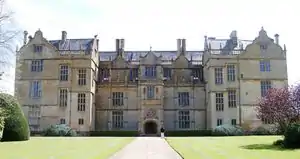Henry Lane Eno
Henry Lane Eno was born in New York City on July 8, 1871; he died at Montacute House, Somerset, on September 28, 1928. A member of the Eno real estate and banking family,[1] he was the son of Henry Clay Eno and his wife Cornelia, the daughter of George W. Lane of New York.[2]

Eno, a member of the circle of Mary Seney Sheldon, built the Fifth Avenue Building on the site of his grandfather's Fifth Avenue Hotel facing Madison Square; an unpaid researcher at Princeton University with the courtesy title of "Professor", he was better known as a psychologist, author and poet.
Having graduated from Yale College in 1894, and gaining an L.L.B. from Columbia (though he never practiced), in 1898 he married his first wife Edith Marie Labouisse.[3] On the death of his father in 1914, Eno inherited a fortune estimated at over $15,000,000;[4] this was considerably increased when in 1919, he successfully contested the $10 million will of his unmarried uncle, Amos F. Eno, a son of the builder and owner of the Fifth Avenue Hotel,[5] for decades New York's grandest and most fashionable, the engine of the Eno fortune, founded in textile merchandising; Amos Eno was a founder of the Second National Bank of New York. The nephew claimed he needed the money for the education of his children, Amos and Alice.[6][7]
Eno was the principal donor of Princeton's Eno Hall. Completed in 1924, it was described at the time as "The first laboratory in this country, if not in the world, dedicated solely to the teaching and investigation of scientific psychology."[8]
Eno's wife died in February 1922 at Princeton; in September 1923, he remarried in England, and settled there with his much younger English wife, Flora Napier.[9][10] The couple rented one of England's finest Elizabethan mansions, Montacute House in Somerset.[11] His daughter, Juliet (later Princess Alexei Melikoff) was born there in 1925.[12] Eno's widow Flora married, on August 1, 1931, (Ernest) Rupert Bertram Ogilvy Freeman-Mitford, son of Algernon Mitford, 1st Baron Redesdale, and became the mother of the 5th Baron Redesdale. She died on December 20, 1981.[13]
Works by Henry Lane Eno
- Activism, an essay in philosophy (1920) [14]
- The Baglioni, a verse play in five acts (1905).
- The Wanderer, an extended poem (1921)
See also
References
- The family descends from James Eno (1625-1682) of Windsor, Connecticut.
- The National Cyclopaedia of American Biography. Volume 22 By James Terry White Accessed November 8, 2009
- New York Times, Wednesday, October 20, 1898. Page 7. Accessed November 8, 2009
- "Fifth Av. Building Suit", The New York Times, April 21, 1918, accessed November 9, 2009.
- "The Simsbury Free Library: The Original Trustees, part 5", Simsbury Genealogical and Historical Research Library 14.3 (Fall 2007) [Simsbury Free Library Quarterly](downloadable pdf file; scroll down).
- Eno's daughter, Alice Labouisse Eno (born August 19, 1903), married Henry Lennox D'Aubigne Hopkinson, 1st Baron Colyton in 1927. She died on April 30, 1953.
- New York Times Friday, May 30, 1919. Page 7. Accessed November 8, 2009.
- Eno Hall.From Alexander Leitch, A Princeton Companion, copyright Princeton University Press (1978). Accessed November 8, 2009.
- New York Times, Page 10. Monday, February 6, 1922 Accessed November 8, 2009
- Flora, the daughter of Cmdr. Gerald Talbot Napier, R.N. later remarried. Her second husband was The Hon Ernest Freeman-Mitford, the son of the 1st Baron Redesdale. Thus, Flora became an aunt of the Mitford sisters. She died in 1981.
- Occasion, chance and change: a memoir 1902-1946 By Henry Colyton. p61 Accessed November 8, 2009.
- The Eno and Enos family in America: descendants of James Eno of Windsor, Conn By Douglas C. Richardson. Accessed November 8, 2009.
- Mosley, Charles (2003). Burke's Peerage, Baronetage and Knightage. London: Burke's Peerage. ISBN 0-9711966-2-1.
- Activism. Accessed November 8, 2009